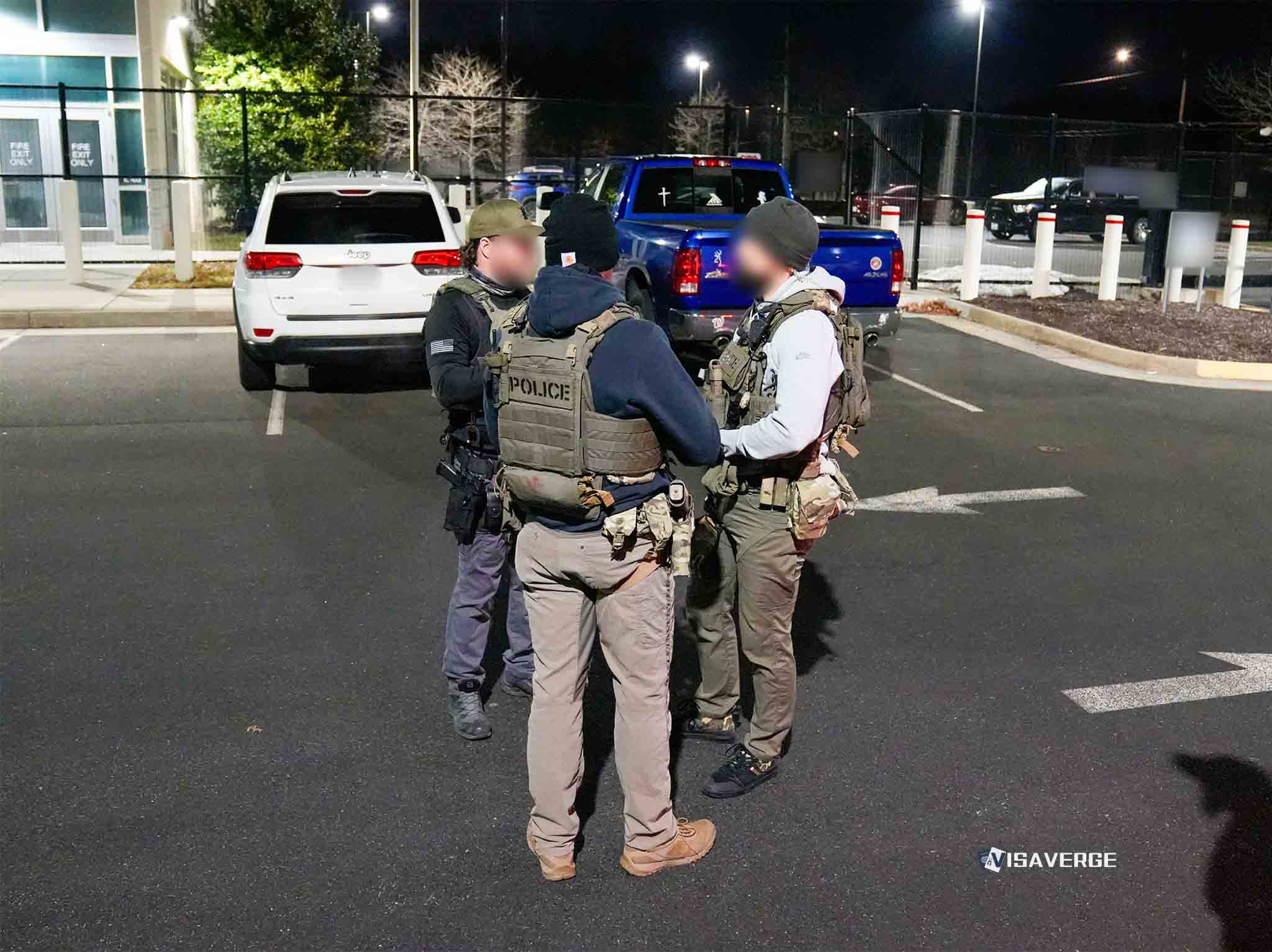Key Takeaways
• Job Garcia, a U.S. citizen, was arrested by ICE on June 19, 2025, during a Hollywood Home Depot raid.
• MALDEF filed a $1 million lawsuit alleging illegal arrest, excessive force, and free speech violations against ICE agents.
• Garcia was detained over 24 hours despite confirmed citizenship, raising civil rights and immigration enforcement concerns.
A U.S. citizen’s arrest during an Immigration and Customs Enforcement (ICE) raid at a Home Depot in Hollywood, California, has sparked a heated debate about civil rights, immigration enforcement, and government accountability. On June 19, 2025, Job Garcia, a 37-year-old PhD student at Claremont Graduate University, was tackled, arrested, and detained for more than 24 hours after recording the ICE operation on his phone. The incident, which took place in a public parking lot, has led to a $1 million lawsuit and raised pressing questions about the treatment of citizens and immigrants during enforcement actions.
What Happened: The Arrest of Job Garcia

Who: Job Garcia, a U.S. citizen and doctoral student
What: Arrested and detained by ICE agents
When: June 19, 2025
Where: Home Depot parking lot, Hollywood, California
Why: Garcia was recording an ICE raid, exercising his right to document government activity
How: ICE agents tackled Garcia, threw him to the ground, arrested him, and held him for over 24 hours, despite confirming his citizenship and lack of criminal warrants
According to the Mexican American Legal Defense and Educational Fund (MALDEF), Garcia was observing and recording the ICE operation when agents approached him. Despite identifying himself as a U.S. citizen, Garcia was forcibly detained. He was first held at Dodger Stadium, then transferred to the Metropolitan Detention Center in Los Angeles. During his detention, Garcia reported hearing agents refer to those arrested as “bodies,” a term he found deeply dehumanizing.
The Legal Response: MALDEF Files $1 Million Lawsuit
MALDEF, a leading Hispanic civil rights organization, has announced plans to file a $1 million lawsuit on behalf of Job Garcia. The lawsuit alleges that ICE agents violated Garcia’s civil rights by arresting and detaining him without probable cause. MALDEF’s president and general counsel, Thomas A. Saenz, described Garcia’s actions as “heroic,” emphasizing that documenting government activity is a fundamental right in a democracy.
Key Allegations in the Lawsuit:
– Unlawful Arrest: Garcia was detained despite being a U.S. citizen with no criminal record or outstanding warrants.
– Excessive Force: Agents tackled and threw Garcia to the ground without justification.
– Violation of Free Speech: Garcia was arrested while exercising his right to record a public government operation.
– Dehumanizing Language: ICE agents allegedly referred to detainees as “bodies,” raising concerns about agency culture and respect for human dignity.
MALDEF’s legal action aims not only to secure compensation for Garcia but also to set a precedent that protects others from similar treatment.
Civil Rights and Immigration Enforcement: What’s at Stake?
The arrest of Job Garcia highlights broader concerns about the conduct of Immigration and Customs Enforcement agents during raids. While ICE is tasked with enforcing immigration laws, the agency’s methods and accountability have come under increasing scrutiny, especially when U.S. citizens and legal residents are caught up in enforcement actions.
Civil Rights Concerns
Freedom to Record:
Recording police and government activity in public spaces is protected under the First Amendment of the U.S. Constitution. This right is especially important during law enforcement operations, as it helps ensure transparency and accountability.
Due Process:
Every person in the United States 🇺🇸, regardless of citizenship status, is entitled to due process under the law. This means that law enforcement must have a valid reason—known as probable cause—to arrest or detain someone.
Equal Protection:
The U.S. Constitution guarantees equal protection under the law. Arresting a U.S. citizen without cause raises serious questions about whether ICE agents are respecting these protections.
ICE’s Use of Force and Language
Garcia’s account of being tackled and hearing agents refer to detainees as “bodies” has drawn criticism from civil rights groups. Such language can reflect a culture that devalues the people ICE is supposed to serve and protect. It also raises questions about the training and oversight of ICE agents.
As reported by VisaVerge.com, incidents like Garcia’s are not isolated. There have been previous cases where U.S. citizens and legal residents were mistakenly detained or treated harshly during ICE operations. These incidents have fueled calls for better oversight and clearer guidelines for agents in the field.
The Role of Advocacy Groups: MALDEF and the ACLU
Civil rights organizations play a critical role in holding government agencies accountable. In Garcia’s case, both MALDEF and the American Civil Liberties Union (ACLU) have voiced strong concerns.
MALDEF’s Position
Thomas A. Saenz, MALDEF’s president, has stated that Garcia’s decision to record the ICE raid was in line with democratic traditions. MALDEF argues that the arrest was not only unlawful but also an attempt to intimidate those who seek to document government actions.
ACLU’s Concerns
The ACLU has long warned about the risk of civil rights violations during ICE raids. The organization points out that aggressive enforcement tactics can lead to wrongful arrests, racial profiling, and a climate of fear in immigrant communities. The ACLU supports legal action as a way to hold agencies accountable and push for systemic change.
What Does This Mean for Immigrants, Citizens, and Communities?
The incident involving Job Garcia has far-reaching implications for several groups:
For Immigrants
- Increased Fear: Aggressive enforcement actions can create fear and mistrust in immigrant communities, making people less likely to report crimes or cooperate with authorities.
- Risk of Mistaken Detention: Even legal residents and U.S. citizens can be caught up in raids, as Garcia’s case shows.
- Need for Legal Support: Immigrants and their families may need legal help to protect their rights during enforcement actions.
For U.S. Citizens
- Civil Liberties at Risk: The arrest of a U.S. citizen for recording a public event raises concerns about the erosion of basic rights.
- Precedent for Future Cases: The outcome of Garcia’s lawsuit could set an important precedent for how law enforcement agencies treat citizens during operations.
For Employers and Businesses
- Workplace Raids: Businesses like Home Depot may face disruptions and reputational risks when ICE conducts raids on their premises.
- Legal Obligations: Employers must comply with immigration laws but also have a responsibility to ensure a safe and respectful environment for workers and customers.
For Law Enforcement and ICE
- Training and Accountability: The case highlights the need for better training on civil rights and the use of force.
- Public Trust: Incidents like this can damage public trust in law enforcement agencies, making their work more difficult.
Legal Process and Next Steps
The lawsuit filed by MALDEF seeks $1 million in damages for Job Garcia. The legal process will involve several steps:
- Filing the Complaint: MALDEF will submit a formal complaint in federal court, outlining the alleged civil rights violations.
- Discovery: Both sides will gather evidence, including video footage, witness statements, and internal ICE records.
- Court Hearings: The case may involve pretrial motions, hearings, and possibly a trial if a settlement is not reached.
- Potential Outcomes: Garcia could receive compensation, and the court may order changes to ICE’s policies or practices.
For those interested in learning more about their rights during encounters with immigration authorities, the U.S. Department of Homeland Security provides official guidance on how to interact with ICE and other law enforcement agencies.
Policy Implications: Will This Change How ICE Operates?
The outcome of Garcia’s case could have a lasting impact on immigration enforcement in the United States 🇺🇸.
Calls for Reform
If the court finds that ICE agents violated Garcia’s rights, there may be increased pressure for policy reforms, such as:
– Clearer Guidelines: Establishing clear rules for when and how agents can detain individuals during raids.
– Improved Training: Ensuring that agents understand the rights of citizens and the importance of respectful language and behavior.
– Stronger Oversight: Creating independent bodies to investigate complaints against ICE and other law enforcement agencies.
Impact on Future Raids
The case could also influence how ICE conducts future operations, especially in public places like Home Depot. Agencies may become more cautious about detaining individuals without clear evidence of wrongdoing.
Broader Civil Rights Movement
Garcia’s lawsuit is part of a larger movement to protect civil liberties in the face of aggressive immigration enforcement. Advocacy groups hope that successful legal action will deter future abuses and encourage more people to stand up for their rights.
Practical Guidance: What Should You Do If You Witness or Experience an ICE Raid?
If you find yourself in a situation similar to Job Garcia’s, here are some practical steps to protect your rights:
- Know Your Rights: You have the right to remain silent and the right to record law enforcement activity in public spaces.
- Stay Calm: Do not resist or argue with agents, but calmly assert your rights.
- Document Everything: If safe, record video or take notes about what happens, including agent names and badge numbers.
- Seek Legal Help: Contact organizations like MALDEF, the ACLU, or a trusted immigration attorney for assistance.
- Report Misconduct: File a complaint with the appropriate agency if you believe your rights have been violated.
Resources for Legal Support and Advocacy
Several organizations offer support for individuals affected by immigration enforcement actions:
- MALDEF: www.maldef.org
- Carrillo Law Firm: www.carrillofirm.com, Phone: 626-799-9375
- ACLU: www.aclu.org
These groups provide legal advice, representation, and advocacy for those facing civil rights violations.
Conclusion: Why This Case Matters
The arrest and detention of Job Garcia during an ICE raid at Home Depot is more than just a personal ordeal—it’s a test of the United States 🇺🇸’ commitment to civil rights and the rule of law. The case raises important questions about how immigration enforcement is carried out, how citizens are treated, and what protections exist for those who document government actions.
As the lawsuit moves forward, it will be watched closely by civil rights advocates, legal experts, and communities across the country. The outcome could shape not only the future of ICE operations but also the broader fight for civil liberties in the United States 🇺🇸.
For anyone concerned about their rights during immigration enforcement actions, staying informed and seeking legal support is essential. The story of Job Garcia serves as a reminder that the protection of civil rights is a responsibility shared by all—citizens, immigrants, and government agencies alike.
Learn Today
ICE → Immigration and Customs Enforcement, a U.S. agency enforcing immigration laws and conducting raids.
Probable Cause → A reasonable basis for law enforcement to believe a crime occurred, required for lawful arrests.
First Amendment → Part of the U.S. Constitution protecting freedoms of speech, press, and peaceful assembly.
MALDEF → Mexican American Legal Defense and Educational Fund, a civil rights organization advocating for Latinos.
Due Process → Legal requirement that the government must respect all legal rights owed to a person.
This Article in a Nutshell
In a Home Depot ICE raid, citizen Job Garcia was wrongly arrested for recording agents, sparking a $1 million lawsuit and civil rights debate. The case exposes concerns about enforcement overreach, use of force, and protections for citizens exercising their rights during immigration operations.
— By VisaVerge.com













